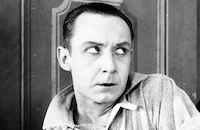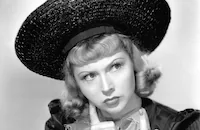Imitation of Life

Brief Synopsis
Cast & Crew
John M. Stahl
Claudette Colbert
Warren William
Rochelle Hudson
Ned Sparks
Louise Beavers
Film Details
Technical Specs

Synopsis
After her husband's death, Beatrice Pullman continues his maple syrup business and hires Delilah Johnson to take care of her home and daughter Jessie. Delilah moves in with her daughter Peola, who, although she is light-skinned, is black like her mother. After tasting Delilah's delicious pancakes, made from a family recipe, Bea uses her gumption and ingenuity to open Aunt Delilah's Pancake House. The restaurant is a success and they are finally able to live comfortably, but Peola grows up resenting her heritage, as she feels it separates her from the rest of society. On the suggestion of vagrant Elmer Smith, Bea boxes the pancake mix, and hires Elmer as her manager. Bea prints Delilah's likeness on every box, and the business becomes a multimillion dollar corporation. Although she makes twenty percent of the profits, Delilah chooses to stay on as Bea's maid. At a party celebrating the tenth anniversary of the business, Bea meets ichthyologist Stephen Archer, who is a friend of Elmer. Bea and Stephen fall in love and make plans to marry, but decide to wait until Jessie meets him. Jessie returns home for a vacation from college, but Bea asks Stephen to look after her as she is compelled to go to Virginia with Delilah to find Peola, who has run away from college. In Virginia, Delilah finds Peola working at a restaurant that prohibits black customers. Peola bitterly denies knowing Delilah, and runs out of the restaurant. She returns home briefly, however, where she disowns Delilah so that she can lead a non-segregated life. In the meantime, Jessie has fallen in love with Stephen, although he has given her no encouragement, and thinks of her as a mere child. Peola's departure proves too much for Delilah, who becomes gravely ill. On her deathbed, Delilah asks Bea to take care of Peola should she ever return. Peola attends Delilah's funeral, and becomes overwhelmed by her own selfishness and the loss of her mother. Bea takes her home, and in time Peola agrees to return to college. Acknowledging Jessie's love for Stephen, Bea postpones their wedding indefinitely until Jessie no longer loves him, so that there will be no obstacles. Stephen promises to wait, and Bea and Jessie reminisce about the time when their beloved Delilah first arrived.

Director

John M. Stahl
Cast

Claudette Colbert

Warren William

Rochelle Hudson

Ned Sparks

Louise Beavers
Fredi Washington
Baby Jane

Alan Hale

Henry Armetta
Wyndham Standing
Marilyn Knowlden
Sebie Hendricks
Dorothy Black
Clarence Hummel Wilson

Henry Kolker
G. P. Huntley Jr.
Paul Porcasi
Paullyn Garner
Alice Ardell

Walter Walker

Noel Francis

Franklin Pangborn
Tyler Brooke
William Austin
Edgar Norton
Alma Tell
Lenita Lane
Barry Norton

Joyce Compton
Reverend Gregg
Edna Bowdoin
Daisy Bufford
Ethel Sykes
Monya Andre
Curry Lee

Claire Mcdowell
Norma Drew
Madame Sul-te-wan
Stuart Johnston
Fred Toones

Hattie Mcdaniel
Hayes Robinson
Martin Turner
Libby Taylor
Elizabeth Jones
Bessie Lyle
Julius Molnar

William B. Davidson
Gay Seabrook
Bruce Warren
Crew
Scott Beal
Jack Bolger
Emily Bolman
Barbara Boone
Bernice Boone
Fred Buckley
Philip Cahn
Finley Peter Dunne Jr.
Finley Peter Dunne Jr.
William Ely
Walter Ferris
Fred Frank
John P. Fulton
Merritt Gerstad
Bianca Gilchrist
Archie Hall
Charles D. Hall
Victor Heerman
Victor Heerman
Henry Henigson
Paul Hill
William Hurlbut
William Hurlbut
Alameda Johnson
Alma Johnson
Alan Jones
Gilbert Kurland
Carl Laemmle Jr.
Joe Lapis
Sarah Y. Mason
Etta Mcdaniel
Warren Munroe
M. F. Murphy
Samuel Ornitz
Cora Palmatier
Maurice Pivar
Arthur Richman
Murray Rock
Heinz Roemheld
Jane Romaine
George Schuman
Ernest M. Smith
John M. Stahl
Preston Sturges
Jerry Vernon
Mary West
Maurice Wright

Photo Collections
Videos
Movie Clip




Trailer
Hosted Intro


Film Details
Technical Specs

Award Nominations
Best Director
Best Picture
Best Sound
Articles
Imitation of Life (1934)
Less well known than the 1959 Douglas Sirk remake starring Lana Turner and Juanita Moore, the first film version of Imitation of Life (1934), directed by John M. Stahl, is actually more faithful to the Fannie Hurst novel and in many ways presents a much more socially progressive viewpoint than the Sirk version. For one thing, Stahl's version was ahead of its time in presenting single women as successful entrepreneurs in a business traditionally run by men. Even more significant was its subplot which addressed sensitive racial issues (light-skinned vs. dark-skinned blacks) that were rarely acknowledged in Hollywood films. Not surprisingly, the 1934 film version was attacked by both liberal and conservative critics when it was first released. The liberals felt that Delilah's character was an outdated domestic stereotype ("the jolly black cook") which was unrealistic in the context of the story. After all, Delilah was the one who created the successful waffle recipe and had no need to continue living with Bea as her servant. At the same time, some viewers, particularly in the South, felt it was unbelievable that a white woman would go into business with her maid.
Stahl's version of Imitation of Life is also significant for another reason - Fredi Washington's performance as Peola. According to Jean-Pierre Coursodon in his essay on John M. Stahl in American Directors, "Fredi Washington...reportedly received a great deal of mail from young blacks thanking her for having expressed their intimate concerns and contradictions so well. One may add that Stahl's film was somewhat unique in its casting of a black actress in this kind of part - which was to become a Hollywood stereotype of sorts. Subsequently, the studios cautiously used white actresses in semi-blackface: Helen Morgan in the 1936 and Ava Gardner in the 1951 Show Boat, Jeanne Crain in Pinky, Susan Kohner in the second Imitation of Life."
As for Louise Beavers, her role as Delilah was rather ironic since she made it clear she detested kitchen work and particularly hated pancakes and waffles. On the set, professional white chefs would prepare the food while Beavers, pancake flipper in hand, would stand by, waiting for the director to yell, "Action!" Despite her own feelings about her roles, Beavers built a career on playing cheerful domestics in films with Jean Harlow, Mae West and Carole Lombard, and eventually became one of the first black actresses to have her own television show - Beulah (1952-1953). Imitation of Life is certainly one of her best performances and should have been nominated for an Oscar. Columnist Jimmy Fiddler was one of many who objected to this oversight and wrote, "I also lament the fact that the motion picture industry has not set aside racial prejudice in naming actresses. I don't see how it is possible to overlook the magnificent portrayal of the Negro actress, Louise Beavers, who played the mother in Imitation of Life. If the industry chooses to ignore Miss Beavers' performance, please let this reporter, born and bred in the South, tender a special award of praise to Louise Beavers for the finest performance of 1934."
Not many people know that the actual inspiration for Fannie Hurst's novel Imitation of Life came from a road trip to Canada that the author took with her friend Zora Neale Hurston, the acclaimed black short-story writer and folklorist who wrote Mules and Men (1935), a non-fiction study of black culture in Florida, and Jonah's Gourd Vine (1934), a novel about a black preacher. Hurst had originally planned to call her novel about Bea and Delilah, Sugar House, but changed the title to Imitation of Life just prior to publication. Like most of Hurst's novels, Imitation of Life became a popular screen success as well - in both of its versions. The 1934 version won Academy Award nominations for Best Picture and Best Sound while the 1959 version garnered Best Supporting Actress Oscar nominations for Juanita Moore and Susan Kohner.
Producer: Carl Laemmle, Jr.
Director: John M. Stahl
Screenplay: William Hurlbut
Cinematography: Merritt B. Gerstad
Film Editing: Phil Cahn
Original Music: Heinz Roemheld
Principal Cast: Claudette Colbert (Beatrice "Bea" Pullman), Warren William (Stephen Archer), Louise Beavers (Delilah), Ned Sparks (Elmer), Fredi Washington (Peola at 19), Rochelle Hudson (Jessie at 18), Alan Hale (Martin), Seble Hendricks (Peola at 4).
BW-111m. Closed captioning.
by Jeff Stafford

Imitation of Life (1934)
Imitation of Life
Bea Pullman, a white single mother, and her African American maid, Delilah Johnston, also a single mother, rear their daughters together and become business partners. Combining Bea's business savvy with Delilah's irresistible southern recipes, they build an Aunt Jemima-like waffle business and an international restaurant empire. Yet their public success brings them little happiness. Bea is torn between her responsibilities as a businesswoman and those of a mother; Delilah is devastated when her light-skinned daughter, Peola, moves away to pass as white. Imitation of Life struck a chord in the 1930s, and it continues to resonate powerfully today.
The author of numerous bestselling novels, a masterful short story writer, and an outspoken social activist, Fannie Hurst was a major celebrity in the first half of the twentieth century.
Daniel Itzkovitz's introduction situates Imitation of Life in its literary, biographical, and cultural contexts, addressing such topics as the debates over the novel and films, the role of Hurst's one-time secretary and great friend Zora Neale Hurston in the novel's development, and the response to the novel by Hurst's friend Langston Hughes, whose one-act satire, "Limitations of Life" (which reverses the races of Bea and Delilah), played to a raucous Harlem crowd in the late 1930s. This edition brings a classic of popular American literature back into print.
"Daniel Itzkovitz's brilliant edition of Imitation of Life places this controversial novel at the center of U.S. literary, cinematic, and social history. Fannie Hurst's novel deserves to be read in its own right, but here its importance as a register of white anxieties about the ethics of American racism and of consumer fantasies for overcoming the particular body are also showcased richly." - Lauren Berlant, author of The Queen of America Goes to Washington City: Essays on Sex and Citizenship.
Imitation of Life is now available through most major book store chains and online book sellers. And don't forget to watch the 1934 film version of Imitation of Life when it airs on TCM on 3/7 at 12:00 am ET.
Imitation of Life
Quotes
Trivia
Fredi Washington (Peola, Aged 19) was a light-skinned African-American. After playing this role, she was criticized by some in the black community who labored under the misconception that the actress herself practiced self-hatred and would rather 'pass' herself off as white. Ms. Washington was, in fact, an avid civil rights activist.
Notes
Correspondence in the MPAA/PCA files at the AMPAS Library reveal that the AMPP was reluctant to approve Universal's original script because they felt that "the main theme is founded upon the results of sex association between the white and black race (miscegenation), and as such, in our opinion, it not only violates the Production Code but is very dangerous from the standpoint both of industry and public policy." Also objectionable was a lynching scene in the original script in which a young African-American man is nearly hanged for approaching a white woman whom he believed had given him an invitation. In a memorandum for the files, the AMPP noted that they met with Carl Laemmle, Jr. and Universal Assistant General Manager Harry H. Zehner, and "emphasized the dangers involved in treating this story as regards to the possibilities having to do with negroes. It was our contention that this part of the plot-the action of the negro girl appearing as white-has a definite connection with the problem of miscegenation. We pointed out that not only from the picture point of view of the producer himself, but also from the point of view of the industry as a whole, this was an extremely dangerous subject and surely to prove troublesome, not only in the south, where it would be universally condemned, but everywhere else. The lynching scene in this story was discussed with the understanding if used at all, would be considerably modified. The producer suggested that to avoid the inference that the leading character was a descendant of a white ancestor, they would definitely establish that her white skin was due to a rare but scientific fact that such a child might come of a line of definitely negro strain."
On March 22, 1934, AMPP director Joseph I. Breen sent a memo to Will H. Hays at the MPPDA updating him on Imitation of Life, and informing him that the studio was considering dropping the story. Breen sent the script to Maurice McKenzie, Executive Assistant to Hays, who, in addition to noting problems with words and phrases such as "nigger," "Mah Lo'dy" and "Lo'd help," disagreed that the film dealt with miscegenation as "the act of miscegenation has occurred so remotely in the ancestry of the characters that it need not concern us." Nonetheless, he continued that "We here share your concern over the attempt to discuss a racial problem of this nature on the screen, and it is our earnest hope that you will be able to persuade the company to abandon its plans for production." A 3 July memo reveals that Dr. James C. Wingate of the AMPP met again with Harry Zehner and John Stahl, who requested written approval of the script. Wingate demurred, as the AMPP still had not received a complete script and they felt that "the real problem involved in the script occurs in the last part of the story." He further noted that he "discussed with Mr. Stahl the word 'nigger.' He advised me he would not use the word, 'nigger,' with the possible exception of one or two places in the script, and there he will be fully protected. He intends to use the terms 'black'-'colored'-'darky'-and 'negro.'" Although by 17 July the picture had been shooting for two weeks, Breen continued to refuse to approve the script, stating that "it is our conviction that any picture which raises and elaborates such an inflammable racial question as that raised by this picture, is fraught with grave danger to the industry, and hence is one which we, in the dispensation of our responsibilities under the Resolution for Uniform Interpretation of the Production Code, May be obliged to reject."
Baby Jane changed her name to Juanita Quigley during production. According to a news item in Daily Variety, Paul Lukas was originally wanted for the role of "Stephen Archer," but Warren William was borrowed from Warner Bros. instead. A news item in Hollywood Reporter noted that the film was doing a "stand-out business" at the Roxy theatre in New York, where "the Sunday jam resulted in a call for the police and fire departments to keep the waiting crowd in order." The Variety review stated that the "most arresting part of the picture and overshadowing the conventional romance...is the tragedy of Aunt Delilah's girl born to a white skin and Negro blood. This subject has never been treated upon the screen before....It seems very probable the picture May make some slight contribution to the cause of greater tolerance and humanity in the racial question." The Literary Digest review notes that "In Imitation of Life, the screen is extremely careful to avoid its most dramatic theme, obviously because it fears its social implications....The real story [is]...that of the beautiful and rebellious daughter of the loyal negro friend....Obviously she is the most interesting person in the cast. They [the producers] appear to be fond of her mother, because she is of the meek type of old-fashioned Negro that, as they say, 'knows his place,' but the daughter is too bitter and lacking in resignation for them." Imitation of Life was nominated for Best Picture at the 1934 Academy Awards. Modern sources report that the African-American press viewed this film unfavorably, and that Louise Beavers was assisted by the NAACP in influencing the filmmakers to delete the word "nigger" from the screenplay. A modern source includes Dennis O'Keefe (then known as Bud Flanagan) as a dance extra. Universal released a remake in 1959 based on the same source, directed by Douglas Sirk, and starring Lana Turner, John Gavin, Sandra Dee and Susan Kohner (see below).

Miscellaneous Notes
Released in United States 1934
Released in United States March 1977
Released in United States 1934
Released in United States March 1977 (Shown at FILMEX: Los Angeles International Film Exposition (Double Vision-Two different classics made from the same story) March 9-27, 1977.)














